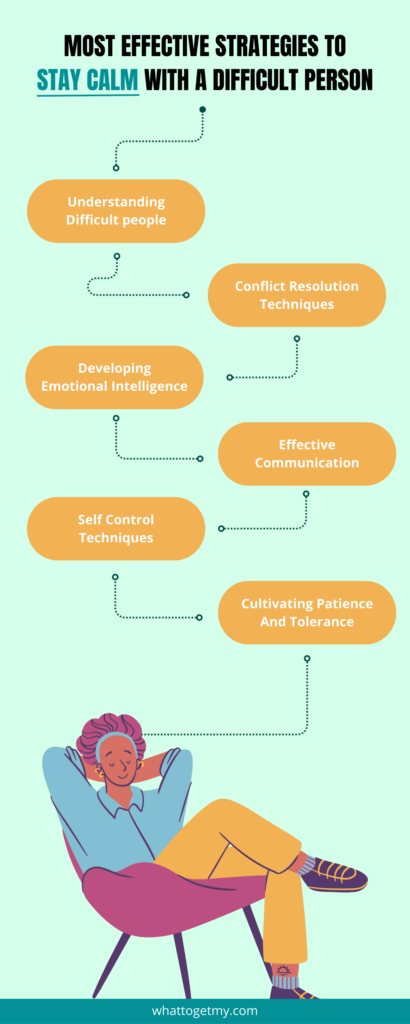7 Most Effective Strategies to Stay Calm with a Difficult Person: Mastering the Art of Composure (2023)
-
Dealing with difficult people is an inevitable part of life. How to Stay Calm with a Difficult Person is a skill we should all acquire.
-
A difficult person consistently displays challenging behaviors, challenging interactions, and relationships.
-
Emotional intelligence refers to recognizing, understanding, and managing emotions in ourselves and others.
-
Effective communication plays a pivotal role in managing difficult relationships.
Effective conflict resolution techniques can be instrumental in staying calm and achieving positive outcomes when dealing with difficult people.
Dealing with difficult people is an inevitable part of life. How to Stay Calm with a Difficult Person is a skill we should all acquire. Whether it’s a coworker or a family member, we encounter individuals challenging our patience and ability to maintain composure. In such situations, it is crucial to stay calm and composed, as reacting impulsively or aggressively can exacerbate the problem and lead to further conflict.
Staying calm when dealing with difficult people cannot be overstated. When we remain calm, we can think objectively, assess the situation, and respond constructively and effectively. It allows us to control our emotions and avoid getting caught up in a cycle of negativity.
One of the key factors in successfully managing difficult relationships is employing conflict resolution techniques. These techniques involve finding common ground, active listening, and seeking mutually beneficial solutions. By engaging in open and respectful communication, we can de-escalate conflicts, address underlying issues, and work toward resolution.
Another vital aspect of managing difficult people is developing emotional intelligence. Emotional intelligence refers to the ability to recognize, understand, and manage our emotions and those of others. It involves empathy, self-awareness, and the capacity to regulate our emotional responses. By harnessing emotional intelligence, we can navigate challenging interactions with empathy and understanding, which can help defuse tensions and foster healthier relationships.
Dealing with difficult people requires staying calm, utilizing conflict resolution techniques, and employing emotional intelligence. These skills enable us to respond effectively in challenging situations, maintain healthy relationships, and promote a positive and harmonious environment. By prioritizing these qualities, we can navigate the complexities of managing difficult relationships and find productive and satisfying resolutions.
Understanding Difficult People:
A difficult person consistently displays challenging behaviors, challenging interactions, and relationships. They can exhibit various traits and behaviors that contribute to their difficult nature. While it is important to remember that everyone has their unique personality, some common characteristics and behaviors often associated with difficult people include:
1. Aggressiveness: Difficult individuals may display aggressive behavior, including verbal attacks, intimidation, and hostility. They tend to be confrontational and may resort to personal attacks when challenged.
2. Defensiveness: Difficult people often tend to become defensive. They may perceive criticism or feedback as personal attacks, which leads them to react negatively and escalate conflicts.
3. Manipulation: Some difficult individuals employ manipulative tactics to control situations and those around them. They may use guilt-tripping, gaslighting, or other forms of emotional manipulation to get their way.
4. Negativity: Difficult people often have a negative outlook on life and focus on problems rather than solutions. They may constantly complain, criticize, or express pessimism, which can be draining for those around them.
5. Stubbornness: Difficult individuals are often resistant to change or compromise. They may insist on having their way, disregarding alternative perspectives or solutions.
Understanding the reasons behind difficult behavior is crucial for effectively managing such individuals. Several factors can contribute to someone exhibiting difficult traits:
1. Personal Insecurities: Difficult people may struggle with deep-seated insecurities manifesting in defensive or aggressive behavior. They may feel threatened by others’ opinions, achievements, or authority, leading them to act as a defense mechanism in difficult ways.
2. Past Experiences: Previous negative experiences, such as trauma, abuse, or unresolved conflicts, can shape a person’s behavior. Difficult individuals may have developed defensive mechanisms or coping strategies contributing to their challenging nature.
3. Communication Issues: Difficulties expressing oneself effectively or understanding others can lead to frustration and difficult behavior. The absence of effective communication skills, emotional intelligence, or a tendency to misinterpret others’ intentions can contribute to difficult interactions.
4. Emotional Imbalances: Some difficult people may struggle with managing their emotions, leading to erratic or intense reactions. This can be due to underlying mental health issues, emotional instability, or an inability to regulate emotions effectively.
It is essential to approach difficult people with empathy and understanding, recognizing that their behavior may stem from personal struggles or past experiences. Doing so can foster a more compassionate and constructive approach to managing and resolving conflicts with difficult individuals.

Conflict Resolution Techniques:
Effective conflict resolution techniques can be instrumental in staying calm and achieving positive outcomes when dealing with difficult people. Here are several techniques that can help navigate challenging interactions:
1. Win-win negotiation: Instead of approaching conflicts as a win-lose situation, strive for win-win outcomes. This involves finding mutually beneficial solutions that address the needs and interests of both parties. By focusing on collaboration and compromise, you can create an environment where both sides feel satisfied with the resolution.
2. Active listening: Actively listening to the other person’s perspective is vital in conflict resolution. Give them your full attention, maintain eye contact, and demonstrate empathy. Validate their feelings and concerns, even if you may disagree with them. Active listening helps foster understanding and builds rapport, creating a foundation for effective communication and resolution.
3. Collaboration: Collaboration emphasizes working together to find common ground and reach agreements. Instead of viewing the other person as an adversary, approach the situation with a mindset of cooperation. Recognizing shared goals and seeking solutions can shift the focus from individual positions to collective problem-solving.
4. Problem-solving: To resolve conflicts, identify the underlying issues causing disagreement. Engage in open and honest communication to understand each other’s perspectives. Then, focus on brainstorming and evaluating potential solutions. Encourage creativity and flexibility in finding alternatives that address the root causes of conflict.
5. Mediation: In more complex or intense conflicts, involving a neutral third party can be beneficial. A mediator acts as a facilitator, guiding the conversation and helping both parties communicate effectively. They remain unbiased and impartial, ensuring a fair process. Mediation can provide a safe space for difficult individuals to express themselves and find common ground.
By implementing these conflict resolution techniques, you can maintain composure, foster constructive communication, and work towards resolving conflicts with complex individuals. Remember, the goal is to find solutions that satisfy both parties’ needs and promote a more positive and harmonious relationship.
According to the survey above, In January 2021, Calm was the most downloaded meditation and sleep app in the United States, accounting for 40 percent of downloads in the segment.
Developing Emotional Intelligence:
Emotional intelligence refers to recognizing, understanding, and managing emotions in ourselves and others. It plays a crucial role in managing difficult relationships, allowing us to navigate challenging interactions with empathy, self-awareness, and effective communication. Here are the five components of emotional intelligence and their relevance in managing difficult people:
1. Self-awareness: Self-awareness involves understanding our emotions, triggers, and behavior patterns. By being aware of our emotional state, we can better manage our reactions to complex individuals. Recognizing our emotional triggers enables us to respond more consciously rather than impulsively, reducing the likelihood of escalating conflicts.
2. Self-regulation: Self-regulation entails managing and controlling our emotions and impulses. It involves deep breathing, pausing before responding or reframing negative thoughts. By practicing self-regulation, we can remain calm and composed in the face of difficult people, allowing us to respond thoughtfully and constructively.
3. Empathy: Empathy is the ability to understand and share the feelings of others. It is crucial in managing difficult relationships, as it allows us to see things from the perspective of the difficult person. By empathizing with their emotions and experiences, we can foster understanding and build rapport, which can contribute to resolving conflicts more effectively.
4. Social skills: Social skills are communicating effectively, building relationships, and navigating social situations. When dealing with difficult people, having strong social skills is essential. This includes active listening, assertive communication, conflict resolution, and finding common ground. We can foster healthier and more productive interactions with difficult individuals by honing these skills, for instance, by getting assertiveness training.
5. Motivation: Motivation involves maintaining a positive mindset and focusing on long-term goals. When dealing with difficult people, getting caught up in negativity or discouraged is easy. By staying motivated and keeping our long-term objectives in mind, we can approach challenging interactions with resilience and determination, reducing the likelihood of being overwhelmed by difficult individuals.
Developing emotional intelligence requires practice and self-reflection. By strengthening these components, we can better manage our emotions, understand difficult individuals’ perspectives, and employ effective communication strategies to foster healthier relationships. Ultimately, emotional intelligence empowers us to navigate difficult relationships with compassion, patience, and understanding.
Effective Communication Skills:
Effective communication plays a pivotal role in managing difficult relationships. It allows us to express our thoughts and concerns, understand the other person’s perspective, and work towards resolving conflicts. We can foster understanding, build trust, and promote healthier interactions by employing effective communication skills. Here are some tips for improving communication skills when dealing with difficult people:
1. Use “I” statements: When expressing your feelings or concerns, use “I” statements instead of blaming or accusing the other person. For example, say, “I feel upset when…” instead of “You always make me angry.” This approach helps to avoid defensive reactions and encourages open dialogue.
2. Be clear and concise: Express your thoughts, needs, and expectations concisely. Avoid vague or ambiguous language that may lead to misunderstandings. Being transparent and direct facilitates better understanding and minimizes the potential for miscommunication.
3. Avoid defensive or aggressive language: Stay mindful of your choice of words and tone. Avoid defensive or aggressive language that can escalate conflicts. Instead, aim for a calm and respectful tone, even if the other person is difficult. Responding with hostility or defensiveness will likely fuel the conflict rather than resolve it.
4. Use active listening techniques: Practice active listening by entirely focusing on the other person’s words, body language, and emotions. Show genuine interest and empathy. Reflect on their thoughts and feelings to demonstrate understanding and validate their perspective. Active listening creates an environment of mutual respect and facilitates more constructive communication.
5. Ask clarifying questions: To ensure clear communication, ask questions, then Politely ask for clarification if needed. If something is unclear or you need more information to be clarified. This helps prevent assumptions and misunderstandings, promoting more transparent communication and reducing the chances of conflicts arising from misinterpretations.
Remember, effective communication is a two-way street. It requires both listening and expressing oneself clearly and respectfully. By actively practicing these communication skills, you can navigate difficult relationships more effectively, establish common ground, and work toward resolution and improved understanding.
Self-Control Techniques
Maintaining self-control and staying calm in the face of difficult individuals can be challenging, but it is crucial for productive interactions and conflict resolution. Here are several strategies to help you cultivate self-control:
1. Deep breathing exercises and relaxation techniques: Stress and anger can escalate when confronted with a difficult person. This is where stress reduction strategies and anger management come in handy. Deep breathing exercises like diaphragmatic breathing can help regulate emotions and induce a sense of calm. Additionally, practicing relaxation techniques like progressive muscle relaxation or visualization can help reduce tension and promote relaxation.
2. Take breaks or step away: Taking a break from the situation is beneficial if you feel overwhelmed or on the verge of losing control. Stepping away lets you gain perspective, collect your thoughts, and prevent impulsive reactions. Take a walk, engage in a calming activity, or simply find a quiet space to regain composure before continuing the interaction.
3. Practice mindfulness and meditation: Mindfulness involves being fully present in the moment and observing your thoughts and emotions without judgment. Regular practice of mindfulness and meditation can enhance emotional stability and self-awareness. It helps cultivate a sense of inner calm and tranquility, enabling you to respond to difficult individuals with more excellent composure.
4. Develop coping mechanisms: Engage in activities that help you manage frustration and maintain emotional balance. Journaling can serve as an outlet for expressing and processing your emotions. Engaging in hobbies or activities you enjoy can provide a healthy distraction and a sense of fulfillment. Find healthy coping mechanisms that resonate with you and make them a part of your self-care routine.
5. Seek professional help or support: If you find maintaining self-control consistently challenging or managing difficult relationships, consider seeking professional help or support. A therapist or counselor can guide self-control techniques and help you develop effective strategies for handling difficult people. They can also offer insights into your emotional triggers and tools for better self-regulation.
Remember, self-control is a skill that can be developed and strengthened over time with practice and patience. Implementing these strategies can empower you to respond to difficult individuals more calmly and constructively, leading to more positive outcomes and healthier relationships.
Cultivating Patience and Tolerance:
Patience and tolerance are essential qualities when dealing with difficult people. They allow us to maintain composure, navigate conflicts, and work toward resolution. Here are some practical tips for developing patience and tolerance:
1. Practicing empathy: Empathy involves putting yourself in the other person’s shoes and seeking to understand their perspective and feelings. Take a moment to consider the possible reasons behind their difficult behavior. Empathy can help foster compassion and reduce the likelihood of responding with impatience or intolerance.
2. Reminding oneself of the bigger picture: In challenging moments, remind yourself of the bigger picture and the long-term goals you want to achieve. Focus on the positive outcomes of managing difficult relationships, such as personal growth, improved communication skills, or a healthier work environment. These goals help maintain patience and tolerance during difficult interactions.
3. Taking a step back and reframing the situation: When faced with a difficult person, take a step back and try to view the situation from a broader perspective. Consider the impact of your response and the potential consequences. Reframing the situation can help you detach emotionally and respond with more patience and tolerance instead of getting caught up in the heat of the moment.
4. Using positive self-talk: Use positive self-talk to reinforce a patient and tolerant mindset. Remember that everyone has challenges, and that difficult behavior often reflects their struggles. Affirmations such as “I choose to respond with patience” or “I will remain calm and understanding” can help redirect your mindset and maintain a positive outlook.
5. Celebrating small victories and progress: Recognize and celebrate small victories and progress in managing difficult relationships. Acknowledge moments when you respond with patience and tolerance, even if it’s a small step forward. This reinforces positive behavior and motivates you to continue developing these qualities.
Remember that developing patience and tolerance is an ongoing process. Cultivating these qualities takes time and effort, especially in challenging situations. Be patient with yourself and acknowledge that setbacks may occur. By consistently practicing these tips, you can gradually strengthen your ability to respond to difficult people with patience, understanding, and tolerance, ultimately fostering healthier and more positive relationships.
Frequently Asked Questions:
Q1: How can I stay calm when dealing with a difficult person?
A1: Practicing self-awareness and emotional regulation is crucial to stay calm with a difficult person. Take deep breaths, remind yourself to stay composed, and carefully choose your words and reactions. Focus on active listening, empathy, and finding common ground, which can help defuse tension and foster a more constructive conversation.
Q2: What if the difficult person becomes aggressive or confrontational?
A2: If the situation escalates and the difficult person becomes aggressive or confrontational, prioritize your safety and well-being. Remove yourself from the immediate danger if possible. If escape is not an option, try to maintain a calm and assertive demeanor, set clear boundaries, and seek assistance from authorities or a trusted third party if necessary.
Q3: Can I change a difficult person’s behavior?
A3: While you can’t control someone else’s behavior, you can influence the dynamics of the interaction. Focus on managing your reactions and responses rather than trying to change the difficult person. You can encourage respectful behavior and improve overall interaction by staying calm, setting boundaries, and communicating effectively. However, remember that some individuals may be resistant to change, and in such cases, it’s crucial to prioritize your well-being and consider setting necessary boundaries for self-protection.



